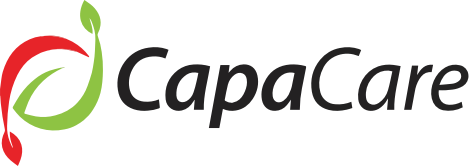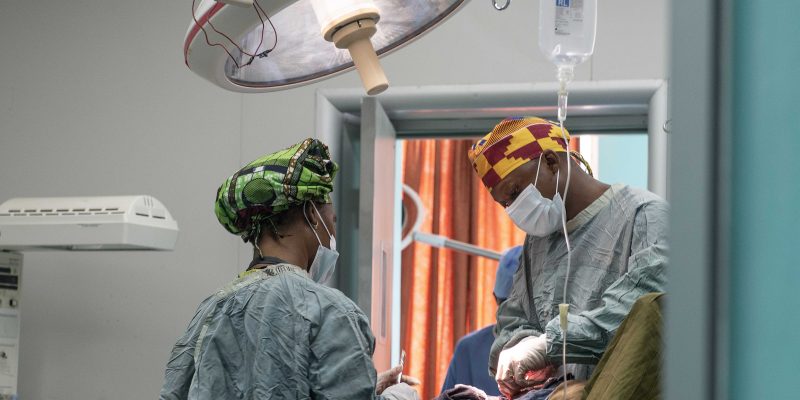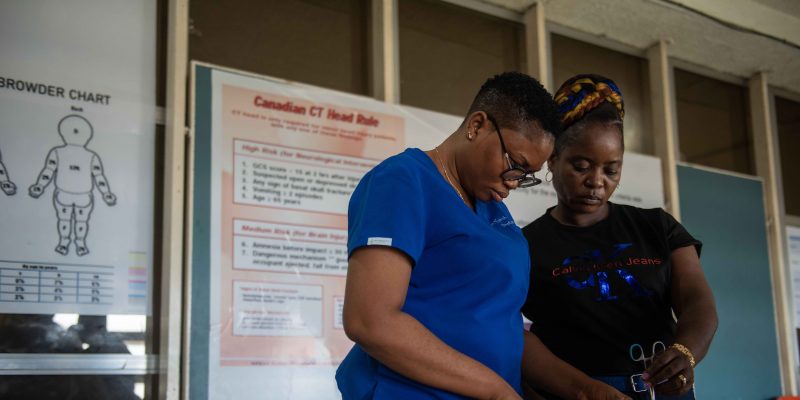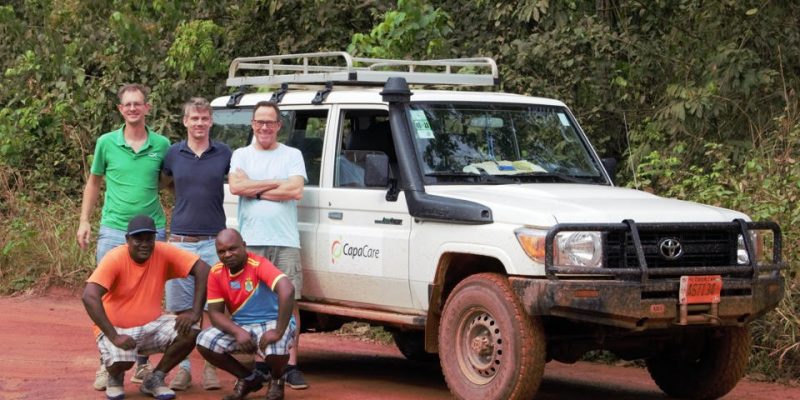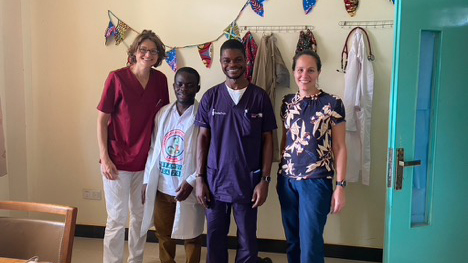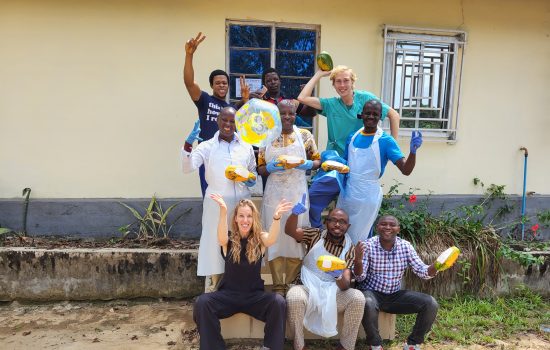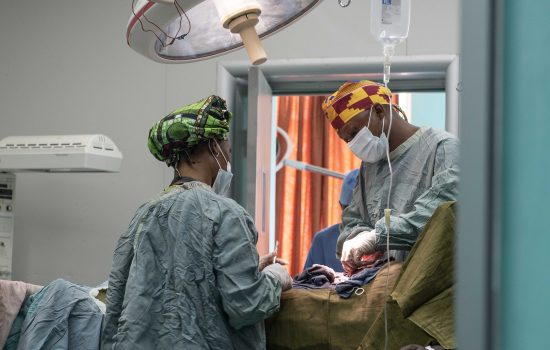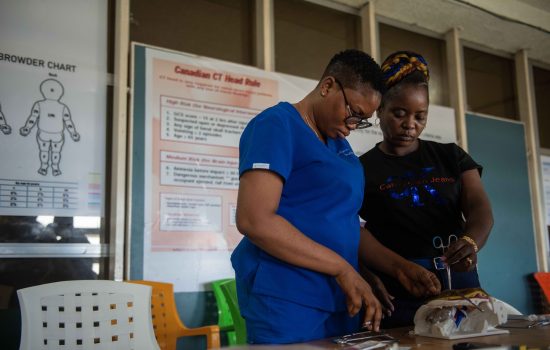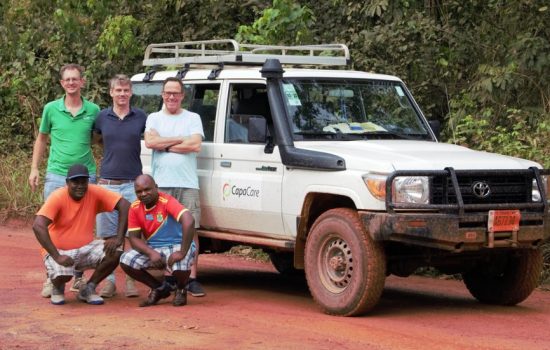Ever since the beginning of CapaCare, it has been an important activity to collaborate with universities, and together with medical students and research fellows facilitating and initiating research projects. We have interviewed medical students Øyvind Veel Svendsen from Norway and Janine Martens from the Netherlands.

Medical students from NTNU (Norway) doing research together with CapaCare. From left Christoffer Helgerud, Alpha, Øyvind, and Alex.
Can you describe how, when, and why you got involved with CapaCare as a student? What was your research topic?
Øyvind: I had a special interest in global health during medical school, and when choosing a topic for my main thesis I knew I wanted to write about something related to that. I contacted Håkon to ask if they had any suitable projects. They needed someone to check the quality of the surgical logbooks that all students and graduates from CapaCare write, so me and my classmate decided to take on this task. We travelled to Sierra Leone collecting data for six weeks in 2016. This resulted in a published article called, ‘Evaluation of a surgical task sharing training programme’s logbook system in Sierra Leone’.
Janine: In the spring of 2019 I was looking for a research topic for my scientific internship as part of my last year of medical school. CapaCare posted a message on the website of the International Office of my university that described exactly what I was looking for: an international research group abroad, doing clinically relevant research in a challenging setting. As part of the household survey, called PRESSCO’20, we would be helping with all the on-the-ground work for the data collection. Our special interest was in surgical volume (the number of surgeries performed within the country in one year) to see what the actual status of surgical care in the country was and to hopefully find recent numbers to be able to advocate for surgical care. I travelled to Sierra Leone for the first time in September 2019 and then became part of the CapaCare family.

Janine and three research nurses of the PRESSCO’20-study
How was your experience of doing research in Sierra Leone together with CapaCare? Has the experience made any impact in your life or your career?
Øyvind: Doing research with CapaCare was a great introduction to global health and global health research. You get to be a part of a team of talented and engaged people that has a lot of experience doing research in the area. Collecting data in a low-income country like Sierra Leone is a real challenge, but also a great learning opportunity and a way to experience the country in a unique way. You are also expected to do a lot of the planning of the research project yourself, of course with good guidance, which makes you get a strong feeling of ownership of the product.
The research project in Sierra Leone was a good way to get to know CapaCare better, and I have been involved in the organisation as a board member for several years now. It has also made it easier to travel abroad with other NGOs.
Janine: Doing research in Sierra Leone together with CapaCare has been a challenging and (therefore) life-enriching experience. Doing research, in general, can be very frustrating sometimes – for days you can feel like you are stuck and can’t come up with a solution, or all the work you did the days before is lost because of something completely different you found out today. Doing research in Sierra Leone is extra challenging as roads aren’t always accessible, electricity and internet aren’t always reliable, chiefs of the villages aren’t always happy to see international personnel and different customs and languages complicates communication.
Also, for me personally, it was difficult to see so many people in need of medical care, but unable to receive it in time. Luckily, I never had to face these challenges alone. So many of the CapaCare family supported me through it all and showed me ways to handle the challenges. All these different challenges taught me something, they made me both a better person and a better doctor. Also, I learned that change is possible. It is slow and it is hard, but it is worth it.
Is there a personal story related to Sierra Leone or CapaCare that you will never forget?
Øyvind: The whole trip was filled with experiences I will never forget, from the brave stories about health care personnel operating during the Ebola epidemic to the patients that were saved by the SACHOs and those that could not, to all the personal encounters with wonderful people. One happy memory I could highlight was a trip we did to get a few days off. After several weeks of travelling all around the country on bumpy dirt roads and long days analysing data, conducting interviews and writing on the article, we went on a weekend trip to Bureh beach. This is a beautiful beach in Sierra Leone with cosy huts on the beach, great seafood, surfing, swimming and great people. It was a perfect way to charge the batteries before travelling back into the jungle to continue the research.

The beautiful Bureh beach

Øyvind collecting data in Bonthe Government Hospital

Øyvind working on his research article in the Masanga office
Janine: As I said, the CapaCare family and other people that crossed my path while being in Sierra Leone or doing work for CapaCare, have made me feel always supported. The outbreak of Lassa Fever in Masanga Hospital in November 2019 was a particularly difficult moment: worrying about the sick, seeing the memories and traumas of Ebola being brought back, having to leave the country while leaving my local colleagues behind, and of course the passing away of Wouter. He was an example of a great physician and a wonderful person. He taught me not to be afraid of making decisions, but see them as opportunities. My Sierra Leonean colleagues showed me in this period what resilience really means. Their unstoppable belief that better times would come made me feel humble and inspired. Their strength and ability to get back up onto their feet after things got tough, is something I will never forget.

Janine with one of the enumeratorteams of the PRESSCO´20-study
What will you say to other students who consider doing research together with CapaCare in the future?
Janine: My first reaction is ‘Say YES! You will not regret it.’ But, of course, not everybody is the same. I think it is important to ask yourself what your intentions are with doing the research. If you decide to go – then be open, try to listen before you judge, and let yourself be amazed by the people, the county, and its culture. It has so much to give if you’re willing to accept it.
Øyvind: If you are interested in global health and want an unforgettable experience in combination with meaningful work, I would highly recommend it. It might be more work than doing a more straight-forward project back home, but it’s worth it. I would do it again in a heartbeat.

Øyvind and Alpha traveling to Bonthe Island by boat to visit the local hospital

Cars stuck in the mud is a common occurrence when doing data collection and travelling in Sierra Leone, but a good team effort always solves the problem
